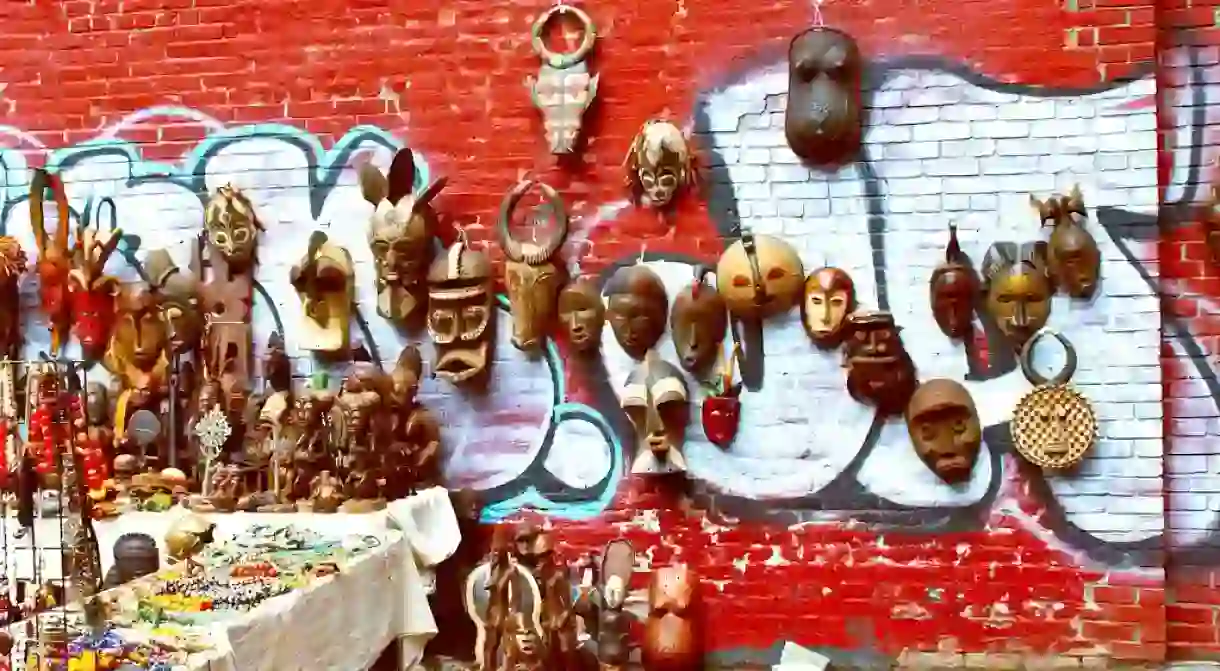The Gift Guide to Accra's Arts Centre

The world is beginning to show more interest in artwork from Ghana by artists like Bright Akwerh, Serge Attukwei-Clottey and Ibrahim Mahama. The critically acclaimed Chale Wote Street Art Festival has also helped draw attention to the country’s arts landscape, generating interest in the paintings, jewellery, sculptures and textiles produced by Ghanaian artists and artisans.
This marketplace houses the largest concentration of traders in artefacts across Ghana, with dozens of stalls specialising in products like talking drums, leather bags from as far away as Mali, wooden dolls and sculpture, as well as a gallery housing the work of local Ghanaian artists. Located a few meters from the Kwame Nkrumah Mausoleum the official name is Centre For National Culture but everyone calls it the Arts Cenre.

Textiles
Kente is the most recognizable piece of fabric from West Africa, with its bold colours and symmetrical patterns handwoven into strips of cloth. The fabric is a source of great respect in Akan culture and worn on important occasions. It tends to be a bit more expensive compared to other textiles such as locally produced wax print or batik, which weigh significantly less than kente. Smocks form northern Ghana are equally as valuable kente. The indigo tunics are versatile and go well with different styles of clothing to make a bold fashion statement.

Beads and Jewellery
Local beads are made from material like clay and wood and glass. Krobo beads (glass) are the best kind to buy and are known for being the only beads in the world that ‘sing’. They come in many different colours and designs and are inexpensive, so you’ll be spoilt for choice. Ghanaian jewellery is also minted into unique indigenous patterns known as Adinkra symbols. Each distinct symbols has its own meaning that reflects the character of the wearer, such as bravery, wisdom and valour. Ghana is a major producers of gold and diamonds, but it isn’t advisable to buy precious jewellery at the Arts Centre. Most of the trinkets there are made from brass, bronze and stainless steel. For real jewellery, upscale shopping malls elsewhere in the city have merchants who can verify the purity of their materials.

Sculptures and drums
Drums are another top seller. They come in different shapes and sizes depending on the ethnic group from which they originate and are carved from strong tropical wood topped with the skins of cattle, antelope or deer. They make good gifts and could accompany a small xylophone or kora. Wooden sculptures are also well represented in the market; with masks, combs, men and women, as well as animals like elephants and lions.

Paintings
Paintings here are usually affordable as most of the artists are not so recognised. You can find good pieces depicting contemporary scenes and traditional heroes. For more serious work, visit some of the major galleries where you can verify authenticity, rather than the Arts Centre. At places like Gallery 1957 and the Artist Alliance Gallery, you can purchase contemporary pieces from famous Ghanaian artists such as Ablade Glover.

Bargaining is acceptable so go ahead and negotiate a good price for yourself. Don’t rush or fall prey to the many hagglers around, be patient and carefully survey the market, you will find some unforgettable treasure by which you will remember Ghana forever.













